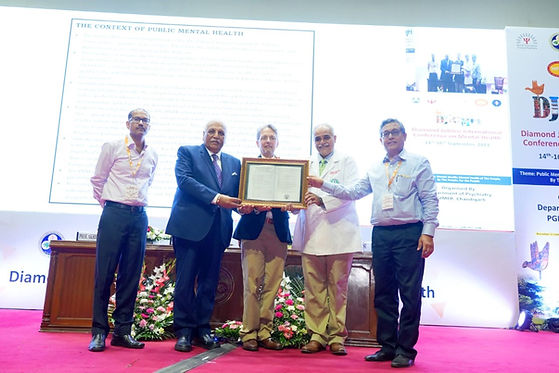
The Chandigarh Charter on Public Mental Health: A Global Initiative to Prioritise Mental Well-being

In a pioneering move aimed at addressing the global crisis of mental health, the Department of Psychiatry at the Postgraduate Institute of Medical Education and Research (PGIMER) in Chandigarh, India, a Collaborating Centre of the World Psychiatric Association (WPA), has released the "Chandigarh Charter on Public Mental Health." This historic charter was unveiled at the Diamond Jubilee International Conference on Mental Health in Chandigarh, which took place from 14 to 16th September 2023.
The Context of Public Mental Health
Mental health is a fundamental component of overall well-being, impacting individuals, families, communities, and societies alike. The interconnection between mental and physical health is undeniable, reflecting the intricate relationship between the mind and the body.
Mental illness constitutes a substantial portion of the global disease burden, affecting not only individuals but also exerting far-reaching consequences on physical, social, and economic health, as well as overall productivity and societal well-being. Conversely, mental well-being has broad positive impacts.
A complex interplay of biological, psychological, socio-environmental, economic, cultural, and ecological factors contributes to the development of mental illness or the nurturing of mental well-being. Evidence-based public mental health interventions exist to prevent, treat, and promote mental well-being, but their implementation varies greatly.
Regrettably, a significant portion of the global population does not receive necessary mental health treatment, particularly in low- and middle-income countries. Furthermore, there is a lack of interventions to prevent mental illness and promote mental well-being. This implementation gap infringes upon the right to health and results in widespread human suffering, societal consequences, and substantial economic costs.
The Chandigarh Charter on Public Mental Health
The Chandigarh Charter on Public Mental Health emphasizes the need for a paradigm shift in the perspective and narrative surrounding mental health. It calls for a renewed focus on the prevention and treatment of mental illness, the prevention of associated impacts, and the promotion of mental well-being. This approach is aligned with the United Nations Sustainable Development Goal of universal health coverage, which includes mental health.
Key principles of the charter include addressing the social and structural determinants of mental health, promoting a collaborative approach that involves multiple sectors and stakeholders, transparently assessing coverage and resource allocation for mental health interventions, advocating for policy change, and allocating resources to address the mental health implementation gap.
The charter envisions that by taking concerted actions and allocating resources, improved implementation of public mental health interventions can be achieved. It aims to transform challenges into opportunities, barriers into openings, and economic costs into benefits, ultimately promoting mental well-being on a global scale.
The release of the Chandigarh Charter on Public Mental Health was witnessed by esteemed figures in the field, including Dr. Afzal Javed (President WPA), Dr. Jonathan Campion (Chair, WPA Public Mental Health Working Group), Prof. Vivek Lal (Director, PGIMER, Chandigarh), and Prof. Debasish Basu (Director, WPA Collaborating Centre Chandigarh), among others.
This charter represents a pivotal moment in the global conversation on mental health, setting the stage for collaborative efforts to prioritise and address mental well-being worldwide.
The full charter can be read here.
 242
242 






